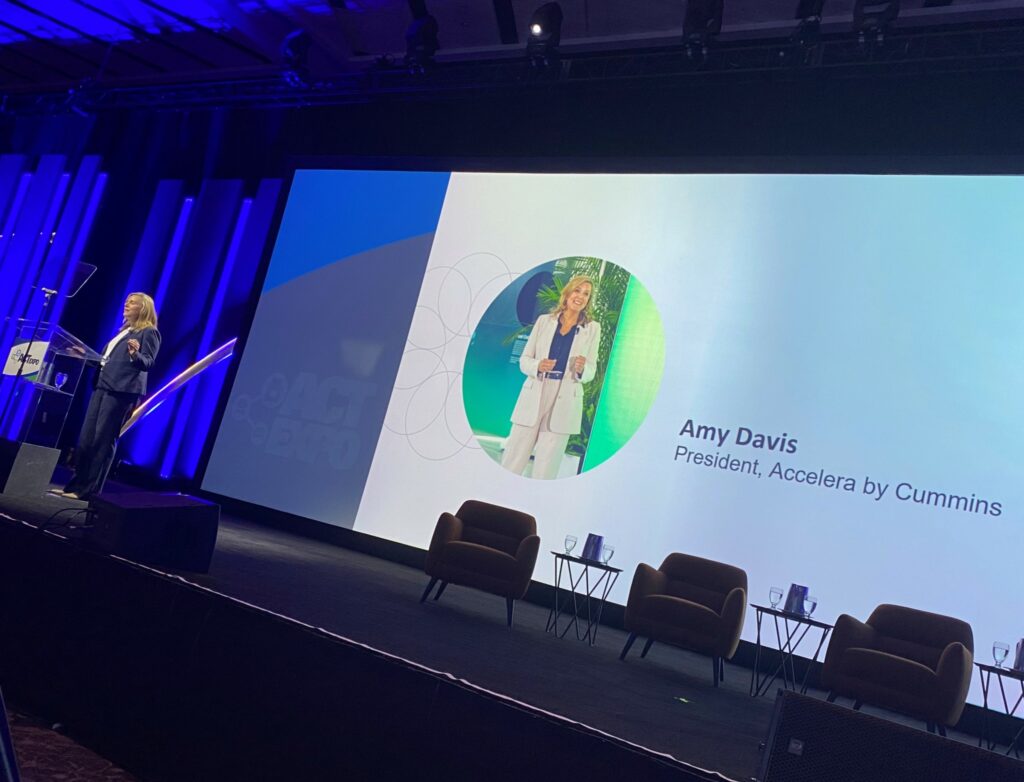Renewable energy investments need to grow fourfold: Accelera president
The goal of zero emissions comes at a cost, and the president of Cummins’ e-mobility business says related investments are still far short of where they need to be.
“Investments in renewable energy sources need to surpass that of fossil fuels by a factor of four over the next decade,” Accelera president Amy Davis said in a keynote address during ACT Expo. “Today, for every dollar put toward fossil fuels, about 90 cents goes to low-carbon energy solutions. That ratio needs to change dramatically – going up to an average of $4 invested for every dollar in fossil fuels.”
Look no further than the growing demand for the energy itself. About 660 million metric tons of renewable and low-carbon hydrogen will be needed by 2050, she said as an example. And the U.S. will need 28 million private electric vehicle charging stations by 2030 to meet federal targets.
“The amount of green energy infrastructure in our country is insufficient. For our industry to decarbonize we need renewable energy sources to make green hydrogen and power our charging stations.”

Infrastructure is lacking
But she also sees gaps that still need to be addressed in vehicles and components.
Davis said she scratches her head when reading reports that suggest there’s a parity in the total cost of ownership between zero-emission vehicles and their traditionally fueled counterparts. The numbers can add up, but “the practicality has some way to go,” she said.
“Infrastructure will play a key role in these choices and a lot has yet to be seen. Where will they be charging? How long does the charging take, and can you get access to low-cost green hydrogen where you need it? And how much will you need to invest in yourself versus counting on the infrastructure coming from the utilities or other entrants?”
So, too, are there safety-related considerations.
“There are real new safety challenges in dealing with high voltage on vehicles, new failure modes we probably haven’t thought of,” she said. “We need to begin understanding the unexpected challenges in operations and the hazards for drivers.”
Even the debates about the best battery chemistries continue.
Nickle-manganese-cobalt (NMC) options are lighter but are more likely to face “thermal propagation”, she said as an example. “This can be a concern as we now have applications carrying 500 to 1,000 kilowatt-hours of battery storage.” Lithium-iron phosphate (LFP) are heavier, but more durable. Then there’s the future promise of lithium-iron-manganese phosphate (LFMP) or even solid-state offerings.
A broad portfolio
For its part, the business widely known for its diesel engines has been investing heavily into a broad portfolio of e-mobility offerings. It acquired its first battery company, Brammo, in 2017. A year later it added Johnson Matthey’s U.K. automotive battery systems business, and Efficient Drivetrains, known for hybrid and electric power solutions.
Last year it acquired Siemens’ Commercial Vehicles business and Meritor, as the portfolio expanded to include everything from inverters to motors.
Cummins has now deployed more electrified components in commercial vehicles than any other supplier, she observed.
“We have spent $1.9 billion, and we now have over 2,000 innovators dedicated to advancing decarbonization with zero-emission solutions.”
In contrast, she questioned many industry startups that are trying to apply automotive options to commercial trucking.
“They naively think that solutions for passenger cars can work and translate for commercial vehicles. We fundamentally believe they will not,” she said. “The technologies that work in passenger car markets will not be the one to win in commercial solutions, in commercial vehicles. The duty cycles are too challenging and diverse.”
Have your say
This is a moderated forum. Comments will no longer be published unless they are accompanied by a first and last name and a verifiable email address. (Today's Trucking will not publish or share the email address.) Profane language and content deemed to be libelous, racist, or threatening in nature will not be published under any circumstances.